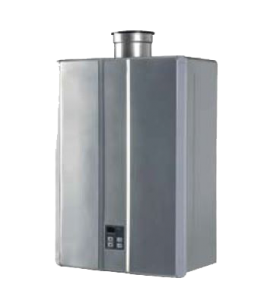

When your water heater breaks, replacing it becomes top priority. If it’s not something that has been replaced in a number of years, the market for water heaters can seem overwhelming. Hopefully, the things listed below can help narrow down any decision necessary to purchase a new tank.
When you think of a water heater, most people will imagine a standard storage water heater. This type of tank has a large, internal container that holds and heats water before use. They have been around for decades but are much more efficient than they used to be due to federally regulated efficiency requirements. They have a much cheaper up-front cost but typically are more expensive to run.
As an example, the water in your tank could be kept at 120° even if the hot water isn’t needed for a few days and there is a lot of overall heat loss. Another good explanation is that it’s like keeping a pot of water boiling all day just in case you felt like making spaghetti for dinner.
Tankless heaters in their basic form are “on-demand” water heating. The way these heaters work is that water enters the unit and then goes to coils that are heated to a pre-set temperature by either a propane burner or an electric heating element. It only heats the water when it’s required. There is a higher upfront cost but depending on how it’s used, it could pay for itself in a few months. Tankless heaters take up less space than a standard storage tank. However, this type of tank is not for everyone.
It is less practical for empty-nesters but could be ideal for large families or anyone with high water usage. More than one tankless heater may be required if there are multiple appliances using hot water at the same time. The tanks can either be connected in parallel or there can be totally different tanks for each appliance.
A water heater’s Energy Factor is the industry’s benchmark for measuring a water heater’s energy efficiency. The higher the EF number, the more efficient the heater is. It is also an indication of the unit’s overall operating cost. The number is set by various tests run by the Department of Energy. It looks at the heat losses within the heater, its piping and its ability to transfer heat to the water in the tank.
Propane water heaters typically have an EF rating of .5 to .65 while electric water heaters are typically around .9. The EF rating does not look at the price per gallon of propane or the price of electricity per kilowatt-hour. When shopping for a new water heater, the EF rating is not the only thing that should be accounted for but it does give a good base idea of what to look for.
Other than the EF, the recovery efficiency is checked as well. This calculation measures the heater’s ability to quickly heat water. Propane water heaters have a much higher recovery rate. Because of that, propane heaters don’t need to store as much water so you can use a much smaller tank. A smaller tank requires less energy so the overall cost to operate is typically much lower.
Propane heaters produce far less carbon emissions than electric heaters. I the United States, most electricity plants are powered by coal, which is one of the biggest culprits of greenhouse gas emissions. Studies have shown that electricity produces double the CO2 when compared to propane.
Other than the actual heater, what’s powering it is another large factor. In a normal year, the price to run a propane water heater compared favorably against an electric model because electricity is a relatively expensive commodity. However, propane shortages have been common the past two years causing the price per gallon of propane to go up. With that in mind, the price of oil is down and the price of propane can be expected to go down with it. If wintertime shortages continue, there is a possibility that a propane-fueled water heater could end up costing more.
Whether you decide on a propane or electric water heater, upgrading to a new tank is something that takes a good amount of research to find the brand, type, and model that works best for your lifestyle. If needed, don’t hesitate to contact a professional for help finding what’s right for you.
Discover information on high-efficiency water heaters here!